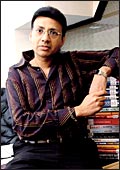 NAME:
Mahesh Chauhan NAME:
Mahesh Chauhan
AGE: 37
QUALIFICATION: M.Tech (Metallurgy), IIT, Powai (1992)
FIRST JOB: Account Executive, Ogilvy & Mather (1992-94)
CAREER PROGRESSION:
1994-96: Account Supervisor, Rediffusion DY&R
1996-98: Account Director, Chaitra Leo Burnett
1998-2002: Vice President & Regional Business Director,
Ogilvy & Mather
2002-04: Vice President (South), Rediffusion DY&R
2004-06: President, Everest Brand Solutions
2006: President, Rediffusion DY&R
"I want to challenge all the existing norms and paradigms"
|
| Help,
Tarun! |
| Designing
Careers |
The
trend is becoming more apparent as liberalisation digs deeper
roots in India. Increasingly, companies are rewarding performance
by appointing relatively young people to very senior, and even
top, positions. India Inc. now has dozens of sub-40 CEOs running
companies in the advertising, media, it, publishing, sports goods
and other industries. And as competition becomes even more intense,
this trend is expected to gather speed. But how do these young
executives cope with the additional pressure? And do companies
have policies to help them settle into their jobs?
"Being young is an advantage since you
bring no managerial baggage," says Rajiv Mehta, 28, Managing
Director, Puma India, who started the company's Indian operations
by himself "rather than with an army of 20 minders"
that someone older may have demanded. "I went down to the
'trenches', visited warehouses and helped with packaging and logistics...
I also treat colleagues as friends rather than as subordinates,
but that doesn't stop me from meeting targets," he says.
That's Lesson 1: go down to the grassroots, get your hands dirty
but get the job done.
Adds Francisco D'Souza, 38, COO & CEO-designate,
Cognizant Technology Solutions: "The one key challenge I
had to face was that I had to constantly reinvent myself-by acquiring
new skills and doing different things. There is a tendency to
focus on the day-to-day operations to the exclusion of these."
His employer gave him enough opportunities to groom himself. He
was asked to set up the company's us operations in 1995; four
years later, he was told to do the same in Europe. These assignments
were difficult and forced him to think on his feet. "The
European market is very different in terms of culture and people
and relatively backward compared to the us in terms of technology
adoption," he says. He had to adapt fast and this gave him
the confidence and the experience to move forward. But now, the
key challenge "is to continue to grow faster than the market
as we have done in the past while maintaining the quality of delivery",
he says. Lesson 2, therefore, is: gain diverse experience; move
out of your zone of comfort and above all, deliver whatever you
commit. Subhinder Singh Prem, 38, Managing Director of Reebok
India, agrees. "I attribute the swift progress of my career
to the diversity of my experience. I have worked in production,
sales and marketing and other departments. Each stint was a learning
experience that added to my well-rounded training in the overall
business. Never say 'this job does not suit me'. Always be open
to working in any department as well-rounded knowledge allows
you to lead by example."
 NAME:
Francisco D'Souza NAME:
Francisco D'Souza
AGE: 38
QUALIFICATION: MBA, Carnegie Mellon University, US
(1992)
FIRST JOB: Managment Associate, Dun & Bradstreet
(1992-94)
CAREER PROGRESSION:
1994: Assigned by Dun & Bradstreet to set up software
operations in India
1996-97: Director (North American Operations), Cognizant Technology
Solutions
1999: Vice President (North America & Europe), Cognizant
Technology Solutions
2001: Senior VP (Operations), Cognizant Technology Solutions
2003: COO, Cognizant Technology Solutions
2007: CEO & President, Cognizant Technology Solutions
"I had to constantly reinvent myself" |
 NAME: Vikas Gupta
NAME: Vikas Gupta
AGE: 38
QUALIFICATION: BE (Electronics), University of Pune
(1989) PG Diploma in Printing & Publishing Studies, London
College of Printing (1990)
FIRST JOB: Senior Manager, Pustak Mahal (1991) Started
Comdex Computer Publishing, a division specialising in IT
books (1992)
CAREER PROGRESSION:
1999: Set up Dreamtech, his own book publishing and software
company
2000: Director, Wiley Dreamtech, a JV he set up with IDG Books
Inc.
2005: Managing Director, Wiley India
"Wiley has encouraged my entrepreneurship" |
Mahesh Chauhan, 37, President, Rediffusion
DY&R, is the youngest head of a multinational advertising
agency in India today and got to his current position by constantly
challenging himself to do better. He shocked many people in 2002,
when he chucked up a seemingly successful job at Ogilvy &
Mather to head Rediffusion down south. His reason? "I was
becoming too comfortable at Ogilvy, and didn't feel too comfy
being so comfy." He left Rediffusion two years later to take
on the challenge of turning around Everest, an agency everyone
had written off. So how does Chauhan cope with the challenge of
leadership? "By challenging all the existing norms and paradigms,
and trying to create something new," he says.
There are no set rules in this game and every
individual has to follow a strategy that suits him best. Vikas
Gupta, 38, Managing Director of Wiley India, started out as an
entrepreneur, floated a publishing joint venture with John Wiley
& Sons, sold his stake to his JV partner and became a professional
CEO of the company he founded. "The best thing about Wiley
is that it encouraged my entrepreneurship and allowed me to build
a motivated team of people. I have never felt my entrepreneurship
stifled by the fact that I am now working for Wiley." That's
Lesson 3: think like an entrepreneur; think of solutions, even
out of the box ones, and focus on delivery.
 NAME: Rajiv Mehta
NAME: Rajiv Mehta
AGE: 28
QUALIFICATION: B.Tech, University Department of Chemical
Technology, Mumbai (2000) M.Tech (Chemical Engineering), University
of Pennsylvania, US (2001) MBA, INSEAD, Singapore (2005)
FIRST JOB: Process Engineer, BOC Gases, New Jersey
(2001)
CAREER PROGRESSION:
2001-04: Process Engineer, BOC Gases, New Jersey
2005: Managing Director, Puma India
"I treat colleagues as friends rather than as subordinates" |
Ajit Varghese, 34, CEO of Maxus India, attributes
his success to his stint at Lintas. "It was while handling
Hindustan Lever's detergent portfolio that I became a thinking
person". When he moved to Madison three years later as coo,
he won the agency the Marico, Asian Paints and Tata Tea accounts.
The lesson here? It's a no-brainer: always keep an eye on the
company's bottom line. The best ideas are of no use if they're
not profitable.
Sometimes, however, these young business
leaders face problems because of their age. Says Vishal Dhupar,
40, Managing Director, Symantec India. "Not every one is
comfortable reporting to a young CEO." He adds that both
his contemporaries and some older executives, who had to report
to him, were initially reluctant to accept his authority. "We
are used to the age-old system where designation is based on years
of experience, rather than capability, and it takes a while to
break down these walls," says Dhupar. The only way to resolve
this problem is to do things better than every one else. The respect,
even if grudging, this generates will finally bring people around.
Organisational support also plays a very
important role in the success of these executives. Says D'Souza:
"Cognizant's culture is a very important factor in the equation.
It believes that people have tremendous capability to deliver
if they are given the necessary environment and support structure,
and so, gets out of your way and gives you the freedom to do your
bit. I am a prime beneficiary of this." Adds Bhaskar Das,
Vice President (HR), Cognizant Technology Solutions: "One
of our main tasks is to groom talent within the company and push
them into leadership positions. For this, we have put in place
systems and processes to identify, train and groom people for
future responsibilities. We then create roles and responsibilities
that allow executives to experiment with their competencies and
capabilities. Performance, by definition, is backward looking,
while potential is forward looking."
Adds Rita Bhattacharya, Director (HR), Reebok
India: "We give people the freedom to be entrepreneurial.
They get the feel of leadership early on and are ready for the
challenge when they actually move into top management positions."
-Reporting by Nitya Varadarajan,
Rahul Sachitanand, Kapil Bajaj & Deepti Khanna Bose
COUNSELLING
Help, Tarun!
 Q: I have been working as a Floor Manager in a call centre for
the last three months. I started as an agent four years ago and
have changed three jobs since then. I do not get along with my
immediate boss. Will a move at this point harm my future career
prospects?
Q: I have been working as a Floor Manager in a call centre for
the last three months. I started as an agent four years ago and
have changed three jobs since then. I do not get along with my
immediate boss. Will a move at this point harm my future career
prospects?
You have been in your present job for just three months and you
are already thinking of quitting? Well, that's not a very good
idea. Since this is your first supervisory job, it will be wise
to stick around for another nine months at least. You don't want
to be a rolling stone forever. And, how can you say for sure that
you will get along with your next boss?
Q: I am a 20-year-old Arts (Political
Science) graduate and plan to get into the armed forces (preferably
the Navy). However, I have been told that only science and commerce
graduates can make it to the forces. Is that true? If no, then
how do I go about things?
While it is true that most positions in the
armed forces are in some way related to science and engineering,
there are jobs such as logistics, education and even law for people
like you. The sailor/cadet cadre is also open to you if you want
to join at that level. Try and visit the site http://www.nausena-bharti.nic.in.
Answers to your career concerns are contributed
by Tarun Sheth (Senior Consultant) and Shilpa Sheth (Managing
Partner, US practice) of HR firm, Shilputsi Consultants. Write
to Help,Tarun! c/o Business Today, Videocon Tower, Fifth Floor,
E-1, Jhandewalan Extn., New Delhi-110055..
Designing
Careers
Outsourced architecture offers huge job opportunities.
Indian
architects are hot property globally. On the one hand, real estate
developers based in the us, Europe and even Singapore are outsourcing
design work to Indian architects; on the other, top-notch foreign
architecture firms like HOK and Laing O'Rourke, which are being
commissioned by Indian real estate developers like Ansal API and
DLF to design big ticket projects, are outsourcing work to their
Indian counterparts. "Foreign architects usually conceptualise
and design projects; the implementation is outsourced to Indian
architects," says Kunal Banerji, Vice President, Ansal API.
This is creating a niche demand for architects, as a result of
which "many architecture graduates are choosing to work with
established companies rather than starting out on their own, as
was the case earlier," says Manit Rastogi, Managing Director,
Morphogenesis Architecture Studio.
-Aman Malik
| FACT BOX |
| WHO'S HIRING? Top architecture firms
and real estate developers.
WHO ARE THEY HIRING? Fresh architecture graduates
as well as more experienced hands.
AT WHAT SALARIES? Rs 2-4 lakh p.a. for freshers;
those with 8-10 years experience can get up to Rs 7-10 lakh
p.a.
WHAT'S THE DEMAND LIKE? Industry-wide figures aren't
available, but considering that 70-75 per cent of the top
100 firms are in hiring mode, the figure will be at least
500-600 architects per year.
|
|





 NAME:
NAME:
 NAME:
NAME:
 NAME:
NAME:  NAME:
NAME:  Q: I have been working as a Floor Manager in a call centre for
the last three months. I started as an agent four years ago and
have changed three jobs since then. I do not get along with my
immediate boss. Will a move at this point harm my future career
prospects?
Q: I have been working as a Floor Manager in a call centre for
the last three months. I started as an agent four years ago and
have changed three jobs since then. I do not get along with my
immediate boss. Will a move at this point harm my future career
prospects?